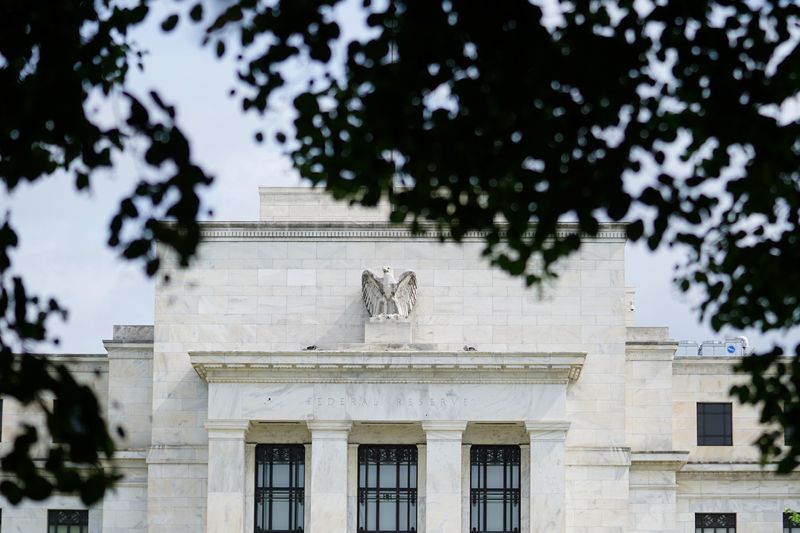By Indradip Ghosh
BENGALURU (Reuters) - The U.S. Federal Reserve will trim interest rates next month but make shallower cuts in 2025 than expected just a month ago due to the risk of higher inflation from President-elect Donald Trump's proposed policies, according to most economists in a Reuters poll.
Prospects for a price resurgence based on his planned policies, including higher tariffs and tax reductions, led markets to nearly halve rate cut pricing to around 75 basis points by end-2025 over the past few weeks.
Relentless economic strength, stubborn inflation and stock markets flirting with record highs have become barriers against hasty rate cuts. Fed Chair Jerome Powell said last week "the economy is not sending any signals that we need to be in a hurry to lower rates."
Still, nearly 90% of economists, 94 of 106, in the Nov. 12-20 Reuters poll expected a 25bp cut in December, taking the fed funds rate to 4.25%-4.50%. Twelve expected no change, compared to only three in last month's survey.
But market pricing showed there is now less than a 60% chance of a December cut. Until recently only a few were betting against such a move.
"We're still calling for a December cut. We think the data will behave. But you can see why markets kind of pricing another sort of coin flip...the economy is still very strong, inflation is still running above target," said Stephen Juneau, a U.S. economist at Bank of America.
"We'll see deregulation, easier fiscal policy, more protectionist trade policy and a tighter immigration stance. They all kind of pose an upside risk to inflation...the Fed is unlikely to cut as deeply as we previously considered because they're going to see inflation continue to be stuck above their target."
BofA recently upped its terminal fed funds rate forecast to 3.75%-4.00% from 3.00%-3.25%.
The inflation outlook over the next two years was broadly upgraded from last month, poll medians showed, with personal consumption expenditures (PCE) inflation - the Fed's preferred gauge - predicted to mostly remain above the Fed's 2% target until at least 2027.
An 85% majority, 57 of 67 respondents, said the risk of inflation resuming next year had risen.
Most economists said Trump's proposed tariffs would be implemented early next year, which according to a strong majority, 44 of 51 will have a significant impact on the U.S. economy.
Tariffs on imports from China could shave up to 1 percentage point from Chinese economic growth next year, a separate Reuters poll showed.
"A universal tariff... on all imported goods and even higher tariffs on Chinese goods are likely to lead to a rebound in inflation," said Philip Marey, senior U.S. strategist at Rabobank.
"Keep in mind unemployment is still relatively low and, especially with increased border security, it would not take long for wage pressures to creep back up. This only reinforces our long-held call the Fed's cutting cycle will be cut short in 2025."
The Fed will deliver a 25bps cut in the first three quarters but then be on hold, poll medians showed, putting the fed funds rate at 3.50%-3.75% by end-2025, 50bps higher than last month's projection. But there was no clear consensus.
Nearly 30% of economists, 29 of 99, predicted the rate to be in a 3.75%-4.00% range or higher and 28 saw it at 3.50%-3.75%, higher than the Fed's 2.9% current estimate of the neutral rate, which neither stimulates nor restrains the economy.
Among 72 common contributors in this and last month's poll, two-thirds, 48, lifted their end-2025 rate forecasts by around 50bps on average.

The U.S. economy, which grew an annualized 2.8% last quarter, will expand 2.7% this year and 2% in 2025 and 2026, poll medians showed. That is faster than what Fed officials currently see as the non-inflationary growth rate of 1.8% over coming years.
(Other stories from the Reuters global economic poll)